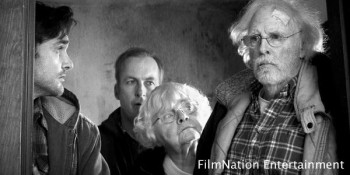Alexander Payne, director of Best Picture award nominee Nebraska, allegedly refused to make the movie for several years until the studio relented to his request that the film be shot entirely in black and white.
But now that Nebraska has been released and is earning nearly unanimous positive reviews, one is left to wonder how it could have been filmed any other way. Not in recent time — sorry, The Artist — has the decision to shoot in black and white so effortlessly and powerfully reinforced the main themes of a film.
For the uninitiated, Nebraska tells the story of Woody Grant, a worn-down man who may be suffering from the effects of Alzheimer’s, convinced that he needs to get from his home in Billings, Mont., to Lincoln, Neb., to claim the winnings of a mail sweepstakes. His son, David, unsuccessfully tries to get the old man to see that the winnings are bogus, but when reasoning fails, he decides he will drive his dad to claim his prize.
Let’s be honest: there’s no easier plot convenience than a buddy road trip setup. Yet to call Woody and David buddies would be a stretch. It’s clear throughout the film that Woody preferred alcohol to parenting, and the relationship now seems frayed to say the least.
As Woody, Bruce Dern gives one of those performances that blogs, magazines, and Hollywood Foreign Presses can’t stop raving about. In this case, they’re all absolutely right. Dern’s performance is a jaw-dropper; layered, believable, and heart-wrenching. Every year of Woody’s long, difficult life seems to be implanted in the cracks of Dern’s face and slow-deliberate nature of his vocal delivery.
Aside from Dern’s powerful performance, June Squibb shines as Woody’s vulgar and put-upon wife, Kate, and Will Forte, as David, gives a nuanced performance that stands as one of the most underrated of this movie season.
And yet, for as good as all of the actors are, what really allows them to shine is Bob Nelson’s stunning script: a delicate, interwoven peek into Midwestern United States life. The dialogue is genuine and authentic of the townsfolk who populate the film’s landscape. When Woody and David make a stop in Woody’s hometown on their way to Lincoln, his old friends and neighbors take the rare opportunity to chat with their friend in a way that somehow manages to condense 30 years of real life into one scripted exchange.
Nelson’s script is a tour-de-force, and when he walks away with the Best Original Screenplay award in a few weeks, you’ll understand why. It’s rare that a film’s script actually has the guts to treat all of its characters with the care they deserve, and this may be Nebraska’s greatest attribute.
Nebraska is one of those films that doesn’t allow for passive viewing. Some may find themselves overwhelmed by nostalgia while watching, and I would be hard-pressed to blame them. The black-and-white pictures on the screen seem to enhance the longing that many characters feel: longing for things lost, for family separated, for hometowns long left. Even amid the film’s bits of brevity and occasional hilarity (thanks, Ms. Squibb!), there is unmistakable sadness at its center that was hard to shake days and even weeks afterward.
